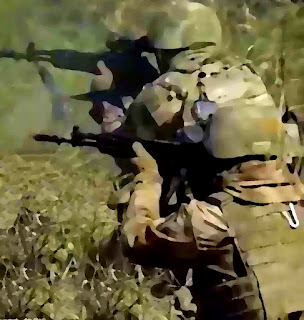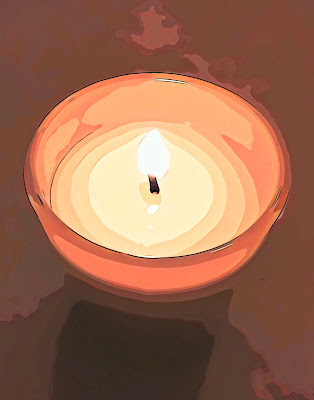The Mother of Jesus, the Mother of the Person of the Word who took flesh in her womb, the Mother of God the Son and the Mother of all of us whom He has claimed as His brothers and sisters in His redemption, is the Queen of Peace.She brings peace to those who call upon her, and that can entail helping to protect us from the oppressor, from men of violence who want to bring ruin and destruction to our land and make us slaves. When we are required to defend ourselves and our country from ruthless invaders, Mary will help us not only to prevail, but also to remain lovers of peace in our hearts, to be free from lust for vengeance, to fight honorably, with justice, and with love - hoping for the enlightenment and conversion of our enemies, and (as Chesterton put it) fighting not out of hatred for the enemy in front of us, but out of love for all that is behind us: our homes, our families, our culture, identity, freedom as a people, and especially for the most poor and vulnerable of our communities who are already suffering violence from the enemy’s attack.
Even in legitimate self-defense - which ought not to be called “violence” because it is by nature resistance against violence - there is nevertheless the danger that the use of force might degenerate into unjust actions, using unjust and dehumanizing means as more expedient ways (or hate-filled, revenge-filled ways) to attain otherwise legitimate purposes, to “do evil so that [a ‘greater’] good may come from it.” Alas, the history of armed conflict is riddled with injustices on all sides (as is the history… of pretty much everything else). We hope, however, for a preponderance of discretion and proportion in the defensive use of force, humility and repentance for failures, and prayer for perseverance in the cause of protecting one’s own people and restoring peace and security against the aggressor.
On October 7, 1571, the pope called on all Catholics to pray the Rosary for the protection of Western Europe from a brutal and overwhelming invasion by the “Islamic State” of that time, and the world-absorbing aspirations of its powerful “Caliphate,” the Sultanate of Ottoman Turkey. On that day, a much-outnumbered European naval force turned away a massive Turkish invasion at Lepanto.
In this month of October 2022, we are once again praying the Rosary for peace. For the past seven months, Ukraine has been robbed of its peace by a monstrous invasion of Russian military forces that have been compelled to play out the grandiose and paranoid imperialistic fantasies of Vladimir Putin. The Ukrainians have a right to defend themselves, and their persistence - against all odds - has earned the admiration of the world.
Ukraine has understandably turned to the enormously wealthy and technologically advanced Western democracies (in Europe and the U.S.A.) for help. And Ukrainian defenders have received a continuous flow of highly sophisticated and otherwise-unthinkably expensive weapons. They are rolling back the Russians with a “counter-offensive,” but Putin and his regime don’t show any intention of withdrawing peacefully. On the contrary, the recklessness has only increased, as the Russian regime has annexed occupied Ukrainian territory, initiated a military draft to muster hundreds of thousands of additional soldiers, and threatens to employ more dangerous weapons (not excluding “tactical” nuclear weapons).
The United Nations condemns Russian aggression in vain. The West appears to want to “help” in technocratic and fiscal ways, and its leaders express a remarkably unified and robust enthusiasm (at least verbally, but also to some extent in their policies) for Ukraine’s rights as a free nation. We who live in Western countries are glad for this, but - aware of the strange, troubled, deeply ambivalent condition of our own societies - we are also “concerned.” We look on with multifaceted apprehension, not knowing what our politicians are trying to accomplish or where the “line” is between a prudent assistance that seeks justice and peace, and a risky gamesmanship that has at least one eye on what benefits our own oligarchs. (Really, let’s not kid ourselves, we have “powerful interests” in the West too, even if they’re more sophisticated and less obvious than Russia’s heavy-handed, bling-adorned robber barons.)
To be fair, it’s hard to see any human means to resolve this crisis or prevent it from becoming an even greater mess. The realpolitik of the moment seems to dictate more economic sanctions against Russia, and more weapons for Ukraine. The Euro-American alliance seeks (dreams?) that Western nations can avoid ever becoming “co-belligerents” if they just use money (strangling the Russian economy) and money (buying more and more weapons for Ukraine) to enable the Ukrainians to win (“by themselves”) what can only be a long, ugly war. Or, at least, the West hopes Ukraine can hold out until Russia experiences some magical “regime change” to instant “democracy” (have we noticed yet that this doesn’t seem to happen, like, ever?).
Please forgive me for my cynical tone. I should add the qualification that many good people (including government officials) are making great, even heroic, efforts to help Ukraine in prudent and courageous ways. They deserve our appreciation and gratitude.
But no one should have any illusions about “the West” (as perhaps too many of us had back in the 1990s). Ukrainians are not getting weapons “for free,” and if they do succeed in driving out the Russian invasion, they will soon learn that the embrace of Western alliance has its own kind of muscles and its own ways of “squeezing” its friends. From their perspective right now, it’s understandable that the Ukrainians feel less threatened by a future in the West than a future in “Greater Russia.” But the former will come with its own costs. One can only hope that Ukraine won’t have to pay too high a price for Western “support” and weapons in the future, in terms of the Ukrainian people’s own freedom to shape their country’s social and economic life.

..
Where else can we place our hope in the face of these events? “Negotiations” need to be more than just an abstract symbol, and at this point compromise is nothing but appeasement. Does anyone think that the mendacious thug-ocracy that rules Russia can be trusted to play a constructive role in Ukraine’s future? Many things must change, starting with respect for the borders recognized by international law and guaranteed by Russian treaty obligations. Of course, we hope for greater things. We are praying (especially since the March 25, 2022 Consecration) for the “conversion of Russia” through Mary’s intercession. This will only happen by God’s grace, but what a magnificent grace it would be for Russia and for the world!While we’re at it, let us continue to pray for the “conversion” of the uber-affluent, corrupt, insatiable, agnostic, deeply confused Western world. The West today is hardly more trustworthy, in the long run, than the Russians. No one can imagine where the “dominant mentality” in the West is headed in its pursuit of money, power, distraction, and licentiousness, nor how big a hole it will dig in the earth as it rages in search of impossible satisfactions. We pray for the conversion of the West, which - for many of us - includes the conversion of ourselves.
We are also praying for the conversion of Ukraine, which - along with Russia - was specially consecrated to the Immaculate Heart of Mary this past March. Something like a miracle is needed for the survival of Ukraine and the avoidance of a longer, vastly larger, and potentially cataclysmic war in the whole region and beyond it. Thankfully, miracles are possible. October 13 marks the 105th anniversary of the miracle of Our Lady of Fatima, who has promised a period of peace for our poor world.
Dare we hope - through the intercession of Mother Mary, the Virgin of Tenderness - that these momentous and tumultuous events in Ukraine (since 2014) are the beginning of something new? Are they the unavoidable “heat” that might help forge a great nation in the future - a nation of “integral human development” and real progress, of genuine democracy and solidarity - a nation whose people move forward, but who are also unafraid to draw from the riches of a millennium of history, from the hidden fruits and the memory (healed through a responsive forgiveness) of the terrible suffering of the past century, and from the vitality of the Christian inspiration that has always at least grounded the Ukrainian people, even if they haven’t always been faithful to it? In merely temporal terms, this is impossible. But conversion can make it possible (at least in some measure). Ukraine needs a renewed Christian inspiration, purified from past prejudices and extreme ethno-nationalist pretensions, and freed to be true to its heart as an evangelical love that vivifies the whole of Ukrainian society while respecting the freedom of everyone.
We should keep all these needs and hopes in our hearts this month, and beyond, when we pray the Rosary. Mary wants to bring us to her Son and His saving love. She is also a tender mother to us. She knows that our lives are difficult and laden with many burdens. She wants to bring peace. She wants all her children to love one another, to respect and appreciate one another, to help and live in solidarity with one another.
Mary is the Queen of Peace, of every kind of true peace, and she brings us hope in these violent times.
































